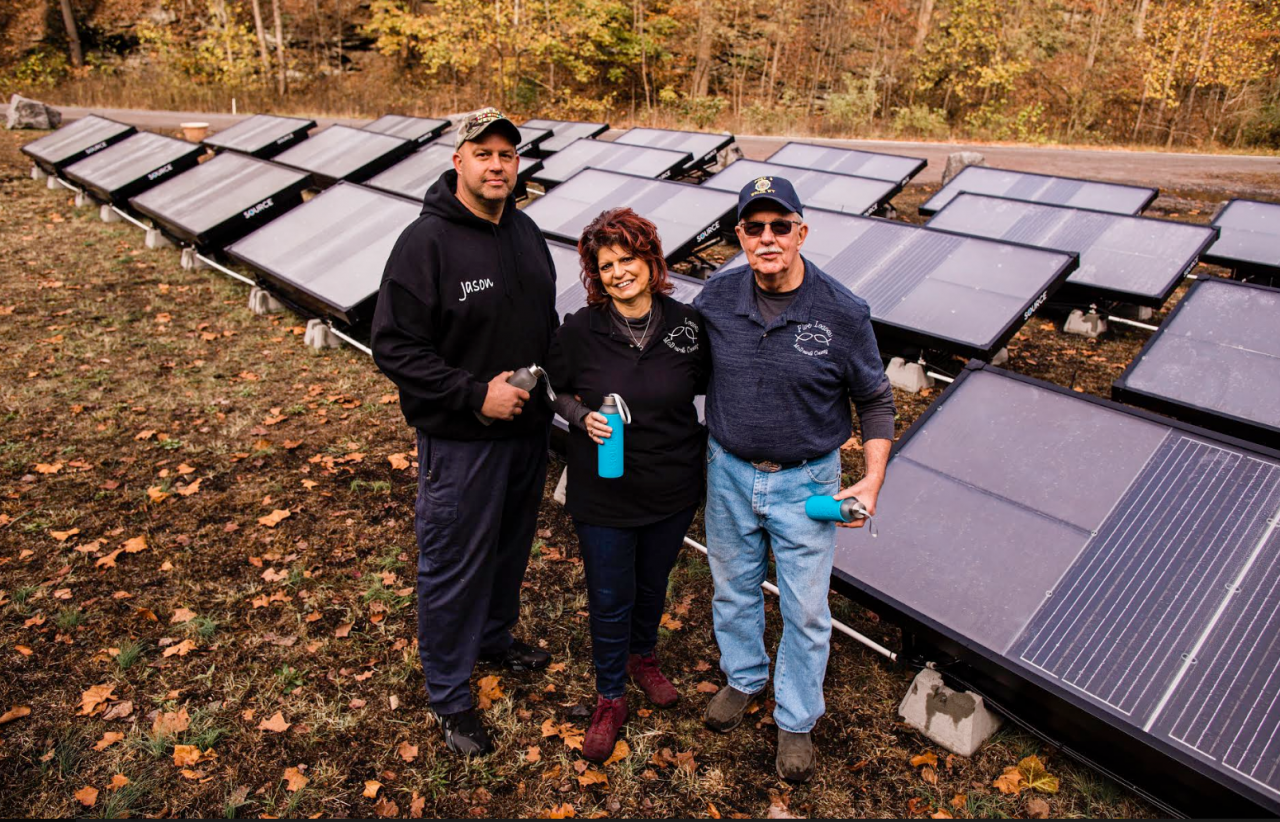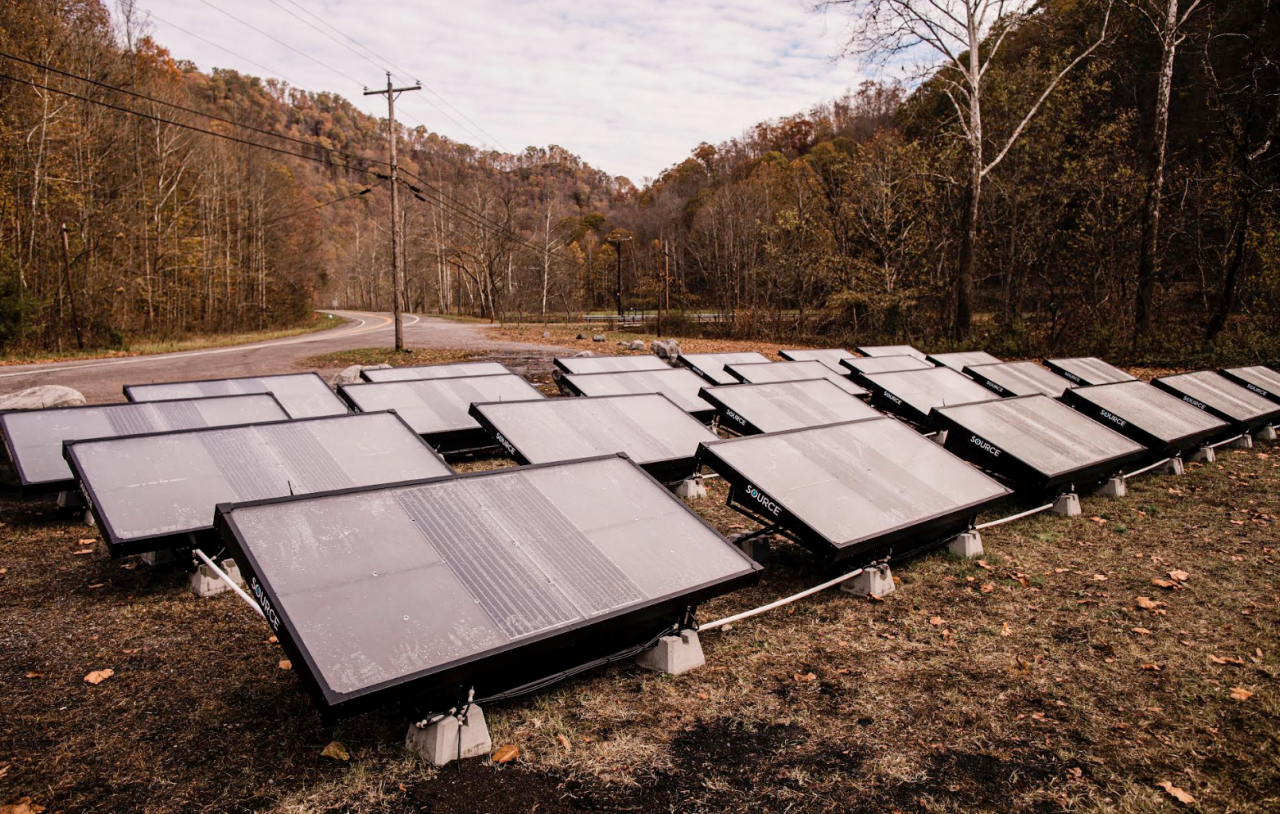In November, 2019, an Arizona renewable water company began a collaboration aimed at improving quality of life and infrastructure in McDowell County, West Virginia through hydropanels. The partnership, which includes Zero Mass Water, one2one USA Foundation, and DigDeep, will provide residents of the rural county with clean drinking water.
The technology itself, the SOURCE Hydropanel, creates drinking water from only sunlight and air, in almost all weather and climate conditions. 24 SOURCE Hydropanels will be installed at the Five Loaves & Two Fishes Food Bank in McDowell County. The Hydropanel array will create up to 3,600 liters of clean, renewable drinking water each month (7,200 bottles worth) and will be distributed to local residents regularly, providing clean drinking water to the food bank’s beneficiaries.
Linda McKinney, co-owner of Five Loaves & Two Fishes Food Bank, told CleanTechnica, “We’re excited to be the first community in West Virginia with Hydropanels that can provide a safe and renewable drinking water supply that we own right at the Food Bank. We’re eager to see other communities embark on this path towards a future where clean water is produced where it is needed most.”
A former coal miner, Scott Shoupe has been retrained to work with and on clean technology projects, including the array and the project at a local level.

Linda McKinney, operator of the Five Loaves and Two Fishes food pantry, joins other food bank volunteers in front of the hydropanels. Water will be distributed in front of the panels. Photo courtesy Zero Mass Water.
The project was fueled by funding and innovation from 3 organizations:
- one2one USA Foundation: which transforms the existing charity model by connecting individuals directly with those in need in a customizable, transparent and impactful way
- DigDeep: a human rights non-profit working to ensure that every American has clean, running water
- Zero Mass Water: whose mission is to make drinking water an unlimited resource simply from sunlight and air
Colin Goddard, director of business development at Zero Mass Water, spoke about the benefits of Hydropanels in a quote for CleanTechnica.
“The SOURCE Hydropanels we installed will help make clean drinking water for the county’s residents using just sunlight and air. But more than that, these Hydropanels operate completely off-grid and are self-sustaining, so in areas like McDowell County where infrastructure and reliable access are uncertain, these Hydropanels serve as an independent water source for those who need it most.”
He continued by describing the reality of water quality issues facing McDowell County, West Virginia and other Appalachian areas
“Water issues throughout Appalachia are, unfortunately, really common. We have a water crisis happening in our own backyards, and McDowell County is a perfect example of how our traditional approaches to infrastructure and water resources are becoming less able to provide us something safe to drink. These issues are only getting worse, so it’s time to make sure that every person, in every place – no matter the location or demographic – has access to water that is not only safe to drink but that doesn’t deplete natural resources or harm the environment to do so. We can turn to technology, which has solved so many of our problems, and invest the time, resources, and partnerships needed in order to put them into practice at scale to create a better future we so badly need and deserve.”
What are Hydropanels?
The core technology powering these projects is a hydropanel, which is a solar-powered and infrastructure-free drinking water solution. It is a non-extractive water resource that is powered by an integral combination of solar photovoltaics and high efficiency solar thermal. The electrical and thermal power is used to produce high-purity water in a modified psychrometric cycle even in some of the driest deserts in the world.
SOURCE operates 100% independent of an electrical grid and creates renewable drinking water with just sunlight and air as inputs. The technology can produce water in relative humidity even below 10%. This process is made possible by the combination of thermodynamics, materials science, and controls technology. Using solar PV to power the system, SOURCE adsorbs — holds molecules of water vapor from the air onto a hygroscopic material. A hygroscopic substance is able to absorb water from its surroundings. Typically, this occurs at or near ordinary room temperature. Most hygroscopic materials are salts, but many other materials display the property.
When water vapor is absorbed, the water molecules are taken into the molecules of the substance, often resulting in physical changes, such as increased volume. Color, boiling point, temperature, and viscosity can also change. When water vapor is adsorbed, the water molecules remain on the surface of the material.
The efficient application of solar thermal heat and cycling of air inside the system increases SOURCE’s internal relative humidity, such that the hygroscopic materials adsorb water in arid environments. Through condensation, the adsorbed water converts into liquid water. Because the hygroscopic materials only attract water molecules, the liquid water produced is pure, similar to distilled. This pure, liquid water flows into each Hydropanel’s integrated reservoir, where it is mineralized with calcium and magnesium and kept clean through regular ozonation.
The body and frame of the Hydropanel are powder-coated steel. Mounting brackets are provided to be used for all installations including ground and roof applications. Production of water by SOURCE Hydropanels is dependent on local measures of relative humidity (RH) and solar energy (kWh). The Hydropanels produce an average of 2-5 liters of water daily.
Here’s the process:
- Ambient air is drawn into Hydropanel, and water vapor in the air adsorbs onto advanced hygroscopic materials.
- Solar thermal power desorbs water from the hygroscopic materials into amplified water vapor cycling within the Hydropanel resulting in liquid water formation, flowing into
the reservoir. - The collected pure water is mineralized for optimal health and taste, and the reservoir is actively managed for cleanliness.
- Water pumps from the onboard reservoir through a polishing cartridge and to a dispenser .
- Each Hydropanel connects to a cloud-based network and is monitored for performance and quality.
Then the Network Operations Center takes over.
- Each Hydropanel connects to the Zero Mass Water Network Operations Center (NOC).
- Data returns from each Hydropanel to the NOC and stores in the cloud with redundancy.
- Hydropanel performance remotely optimizes using machine learning.
- The NOC resolves any alerts remotely or deploys the field service team as needed.
- Cellular Module is FCC, ANATEL, and IC certified.
- Hydropanels optimize to hibernate in freezing temperatures to protect pump and returns to full operation when safe to do so.
All components of the Hydropanel are tested to IEC 61215 equivalency beyond Hydropanel lifetime:
- Solar-Thermal Assembly
- Lower Housing Assembly
- Internal Components
- Reservoir Base Assembly.

Hydropanels — photo courtesy of Zero Mass Water
Final Thoughts
“This project is the perfect example of donors coming together to provide direct access to clean water in a way that is customizable, transparent and impactful,” said Scott Krase, founder of one2one USA Foundation. “one2one, in partnership with Zero Mass Water, is committed to enabling donors to make an impact on the water insecurity problem not just in Kimball, West Virginia, but in many similar communities across the United States in an economical, long-lasting and eco-friendly way.”
“Our strategic partnership with Five Loaves and Two Fishes, leveraging Zero Mass Water’s technology and with the generous support of one2one USA Foundation, is an opportunity for us to work together to imagine new solutions to the US water crisis and place local needs front and center as we provide essential services to deserving communities,” said George McGraw, CEO and founder of DigDeep. “Our ultimate goal in this partnership is to ensure that every community has more agency over their daily lives and more control over their destinies and their ability to thrive. Access to water is a human right, and initiatives like this will bring us all one step closer to ensuring that every American has clean, running water forever.”





